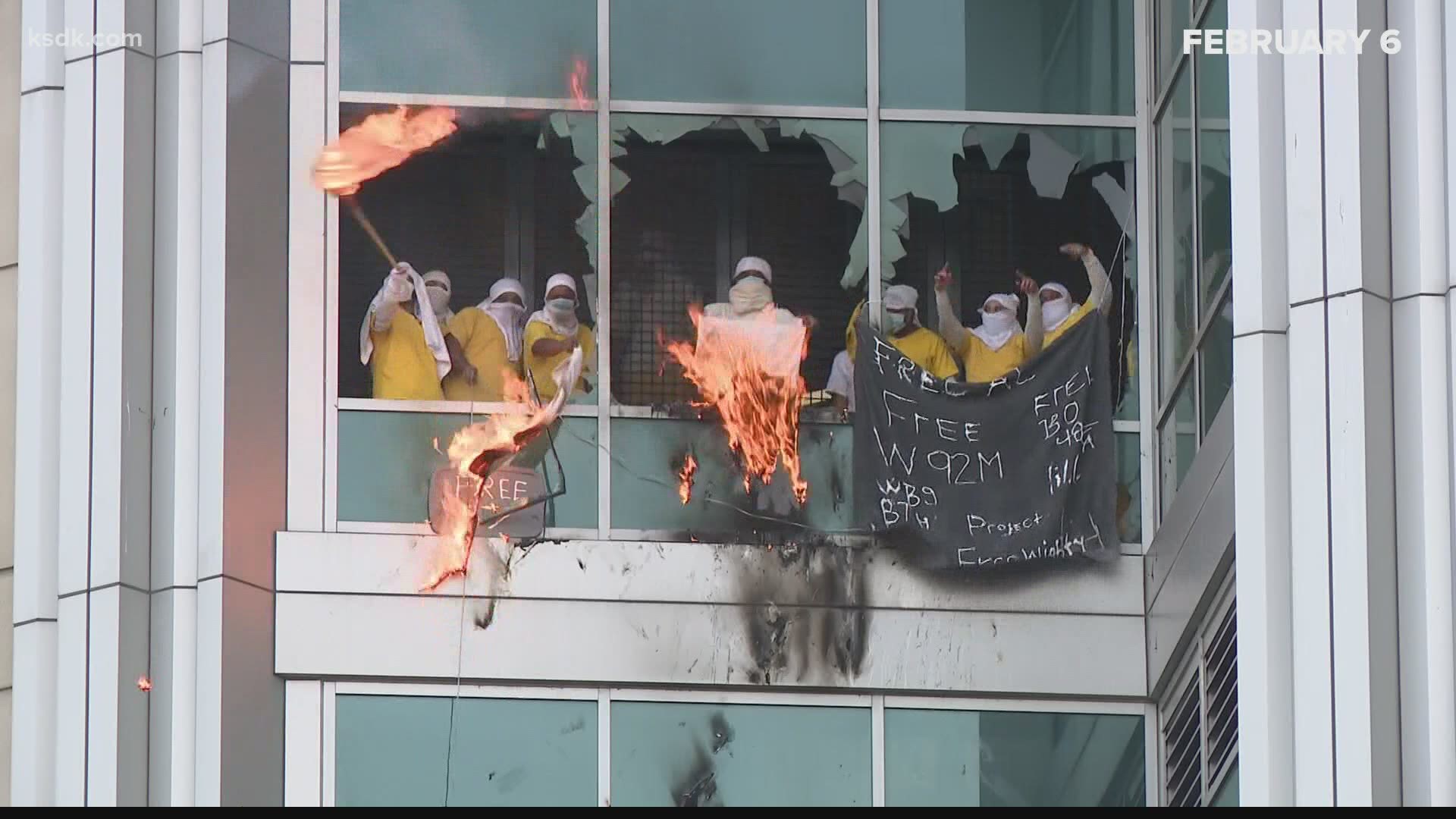ST. LOUIS — Detainees have complained for decades about conditions inside St. Louis' jails, but when COVID-19 worries were added to the mix, the tension reached breaking point.
In the predawn hours of Feb. 6, 117 inmates at the downtown City Justice Center broke free from their cells. They smashed windows, set fires and tossed chairs, a filing cabinet and other items through the broken glass onto the street four stories below. A corrections officer was briefly hospitalized.
“These were just very angry, defiant, very violent people that we house at the justice center,” Public Safety Director Jimmie Edwards said at a news conference that day.
It was the third uprising at the downtown jail since December. Advocates say concerns about COVID-19 are at the heart of the anger.
“They were fed up and scared for their lives,” said Tracy Stanton of EXPO, a nonprofit advocacy group made up of former detainees. “This last resistance happened because they still were not being heard. At this point, the pot had boiled over.”
Edwards said there are “zero” virus cases at the jail. Yet so far in 2021, more than 100 inmates or people speaking for them have called a hotline to report positive tests or coronavirus symptoms, said Inez Bordeaux of ArchCity Defenders, a non-profit law firm that operates the hotline.
Litel Joyner, 60, said his son, Litel Gilmore, 41, tested positive for COVID-19 on Dec. 30 while housed at the justice center.
“He’s really not doing well,” Joyner said. “I think the COVID has kind of taken control of him.”
Edwards' spokesman said he would not comment further.
Inmates complain about a lack of COVID-19 precautions. City officials declined interview requests but cited protocols that include 14-day quarantine periods for each new detainee, masks replaced upon request and testing anytime a detainee or a nurse detects symptoms.
U.S. Rep. Cori Bush, a longtime activist in St. Louis, sent a letter last week to city leaders calling for more transparency about jail conditions and COVID-19 protocols.
“Every person in our society deserves to be treated with dignity and respect,” Bush, a Democrat, wrote.
Mayor Lyda Krewson appointed a task force that plans public meetings as part of its examination of conditions at both St. Louis jails. The task force includes the head of the local NAACP, two aldermen and others, and is led by the Rev. Darryl Gray, a longtime activist leader.
The virus is creating anger inside the jail in another way. Jury trials were shut down early in the pandemic because of social distancing restrictions. Many detainees awaiting trial have been jailed for more than a year with no trial date in sight, said Matthew Mahaffey, who heads the public defender office in St. Louis.
The City Justice Center is the largest of two correctional facilities in St. Louis, opening in 2002. Though relatively modern, one major design flaw has become obvious — some cell locks don’t work.
“Unfortunately, inside of our system in certain units, our detainees have the ability to jimmy their locks,” Edwards said. “And the locks don’t necessarily lock. Even though our automated panel system would indicate the cells are locked, they are in fact not locked.”
The St. Louis Board of Estimate and Apportionment voted Wednesday to spend $1.5 million to fix the faulty lock system. The board decided to use money budgeted for employee salaries at the facility that won’t be needed because of vacancies, said director Paul Payne.
Mayor Lyda Krewson’s spokesman, Jacob Long, said the work is projected to take 10 to 12 weeks. Officials said more money may be needed to cover the overall cost.
In the interim, about half the detainees involved in the uprising have been moved to another floor where the locks work, city spokesman Jacob Long said. The other half were moved to a medium-security jail known as the workhouse.
The workhouse has, for decades, been the subject of criticism. A 2017 lawsuit filed by ArchCity Defenders cited rodent infestations, overflowing toilets, extreme heat in the summer and cold in the winter.
It remains open despite a pledge from the Board of Aldermen last year to close it. City leaders now say closure would lead to overcrowding at the justice center.
Stanton, now a college student, recalled being jailed at the workhouse in 2016 when she was addicted to drugs. She was inside when another female inmate hung herself, and two others suffered serious wounds from spider bites, she said.
Stanton’s brother, Roland Pullum, was jailed on a trespassing charge at the workhouse in 2013. She said he had been stabbed in the head prior to incarceration, and that he died while he was in jail.
“He went from the hospital to the jail,” Stanton said. “He wanted some medical help, something wasn’t right.”
She said guards think detainees who ask for help just want attention or to be let out of their cells.
Bordeaux said detainee treatment isn’t just a St. Louis problem — activists in Los Angeles, New York, Detroit, Atlanta and elsewhere are fighting similar battles.
“Once people walk inside of a jail, we, as a society, immediately tend to strip them of their humanity,” Bordeaux said. “When it comes to the list of priorities that many cities have, taking care of people accused of crime is very far down on the list.”

